Theres a lot more to traveling with a horse than shoving him onto and yanking him off of a trailer. Indeed, if youve ever seen a horse man-handled onto a trailer, youve witnessed an approach so much more forceful than it needs to be and so much less effective than it should be that you may have decided that traveling with your horse simply isnt an option. If you cant ride Old Paint from your home barn to where you want to go, youre just not going.
Or, you might have decided that you never want to own a trailer, load your own horse, or go to a show or to a state park for a trail ride on your own; instead, youll call a horse-transport company and let them load, transport, and unload your horse. The problem with that, of course, is that although the professionals may be quite adept at transporting your horse, they still have to do it, and you have to pay them for their services.
Its unfortunate that so many horse owners think in such clear-cut terms when it comes to trailering, because virtually any horse can be trailered safely by his owner if the owner simply attends to a few details, the most critical being teaching the horse how to load.
In this text youll learn the loading method taught by the late Dr. Edwin Goodwin, long-time equine professor at the University of Maryland. Its a good method because it works, almost without fail. It works quickly on willing green horses; it works fairly quickly on older horses that have always been led; it works a bit more slowly on horses that have had negative loading and/or trailering experiences; and it can help your horse overcome fear, stubbornness, bad training, bad handling, bad nature, and bad horsemanship, at least insofar as loading is concerned.
Trailer-Training
Your Horse
Laura Harrison McBride
CONTENTS
On the Road Again
In todays highly mobile society, its conceivable that in a single journey especially as equestrian competitions continue to expand internationally a horse will board a road vehicle, a railroad car, and an airplane. If the venue is particularly remote, boat travel may also be added to the mix. Still, despite our unmatched ability to transport our horses, often we dont give their journey a second thought, even though their safety and comfort during travel should always be a priority.
The mortality once associated with horse transport the sort that occurred with unfortunate regularity when the New World was populated with European stock is no longer an issue, the lower rates reflecting increasingly sophisticated techniques for managing travel stress. Good feed and management practices keep a horse in prime condition so that any losses of weight or muscle tone during transport are relatively inconsequential. In addition, vaccinations guard against germs a horse may encounter, and the design of trailers and protective equipment (such as leg wraps) gets better each year. Though sickness or injury can certainly add to a horses level of stress during travel, its not the main issue. Allaying a horses fears of loading and unloading through proper training, and minimizing environmental stressors, should be our greatest concern, as these have the most significant impact on the horses stress level and condition during and after transport.
Travel Stress, Equine Style
Studies using heart rate as an indicator of stress show that a horses heart rate is significantly elevated while he is being loaded onto a trailer. Studies also reveal that the steeper the grade of the loading ramp, the greater the horses stress. There are several possible explanations for this reaction:
 A horse instinctively fears dark, enclosed spaces precisely the characteristics of the vast majority of trailers and vans.
A horse instinctively fears dark, enclosed spaces precisely the characteristics of the vast majority of trailers and vans.
 Steep ramps are often covered with hemp matting that can slip. They also tend to be narrow, often only as wide as the horse, so the handler cannot enter with the horse. Uncertain footing and an absent handler increase the horses anxiety.
Steep ramps are often covered with hemp matting that can slip. They also tend to be narrow, often only as wide as the horse, so the handler cannot enter with the horse. Uncertain footing and an absent handler increase the horses anxiety.
 A horse that has had a bad experience loading/unloading or during a trip associates this negative experience with all similar situations and equipment.
A horse that has had a bad experience loading/unloading or during a trip associates this negative experience with all similar situations and equipment.
 A horse that has never been taught how to load properly and that is forcefully manhandled onto a trailer prior to a trip has negative expectations of travel.
A horse that has never been taught how to load properly and that is forcefully manhandled onto a trailer prior to a trip has negative expectations of travel.
Once a horse has been successfully loaded, environmental stressors associated with travel continue throughout the trip. The van may be too hot or too cold; the road may be rough or the driver inexperienced or careless; the hay might run out or the horses neighbor may snap at him when he reaches for a wisp; the floor might be too hard or too slick; and the horse may simply wonder whats happening. In addition, he may not be accustomed to standing still for two hours or six hours or twelve hours. Each of these factors individually, and certainly any of them in combination, results in stress. The less stress a horse experiences during travel, the better.
The Cue-On Loading Technique
Dr. Goodwin is credited by many with inventing the cue-on loading technique, and he was certainly an early proponent in the United States. The basic technique, however, is nearly as old as horse transport and can be found in various guises in equine instruction books of antiquity. Dr. Goodwin spent more than thirty years teaching it to 4-Hers, college equine science students, and private clients. And he taught it to me, his final graduate assistant.
What You Need
In the cue-on method, you use your voice, your body, and a cue to teach your horse to respond positively when you ask him to load onto a trailer. Youll use your knowledge of the process to condition your horse to do what you ask, when you ask. Be observant, heed your horses body language, and be positive. Even the most willing, docile horse will think twice about strolling up a ramp into a dark little hole, never mind stepping up into one. When your horse agrees to do what you ask which, in this case, goes against his instincts he demonstrates infinite trust in you.
Patience is key. Plan to invest time and to control emotion when teaching cue-on loading. Decide how much of the process you wish to accomplish successfully at each training session, and always try to end on a positive note. For an older horse that has come to believe that loading is a horrible thing, limit the number of cues you ask him to accept at each session. If your horse is a bad loader, having him approach the trailer on cue in a straight line may be enough work for one session; having him approach the ramp on cue might be enough for the next. Never give up at the horses insistence, no matter how frustrated you or he may be. You are in charge, not your horse. Only stop working on your own terms.
To reiterate, break up the method into manageable parts that your horse can accomplish successfully at each session, be patient, and soon he will load willingly.
The Horses Motivation
The cue-on method involves reward but not a food reward and not letting the horse off the hook when he has only partially mastered the goals youve set for the particular session. It is more cause-and-effect than carrot-and-stick or even perform-and-reward: simply put, you cue your horse to move forward and he does so to avoid repetition of the cue.
Simple Tools
Many of Dr. Goodwins students were self-proclaimed animal nuts, some of whom had limited equine experience. Of these, some objected to the simple tools a lead rope with chain and a dressage whip that Dr. Goodwin used to teach horses to load. The naysayers assumed that such tools were inhumane, not realizing that what would be severe for a housecat is gentle for a horse. In the cue-on method, cues are given with nothing more stringent than a three-inch bit of string, and this is done mainly to demand the horses attention. Its also used to establish dominance.
Next page

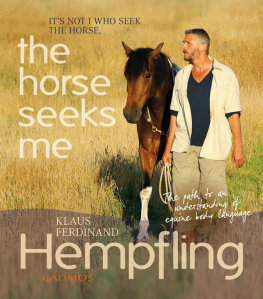

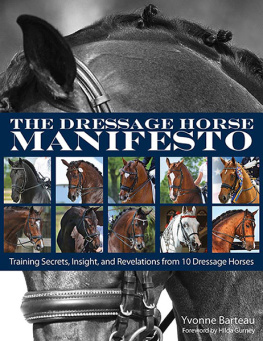
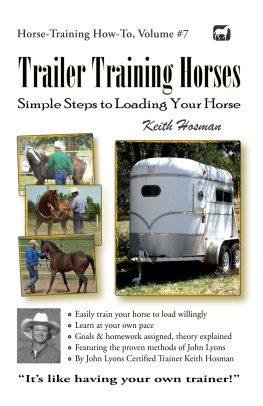
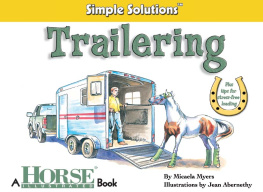
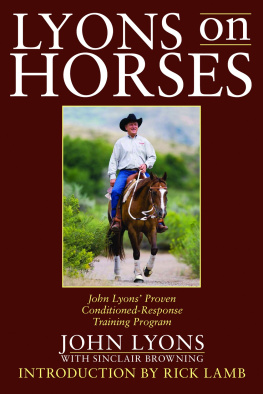
 A horse instinctively fears dark, enclosed spaces precisely the characteristics of the vast majority of trailers and vans.
A horse instinctively fears dark, enclosed spaces precisely the characteristics of the vast majority of trailers and vans.